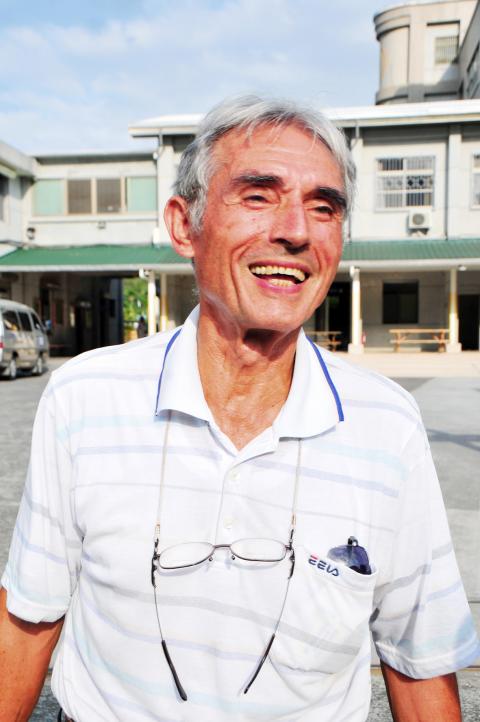The regulation concerning the criteria for foreigners with professional skills to obtain Republic of China citizenship, without being required to renounce their original citizenship, is to be promulgated today, the Ministry of the Interior announced.
The ministry is to promulgate today the regulation, which is in accordance with and supplementing an amendment to the Nationality Act (國籍法) passed by the legislature in December last year that states foreign nationals may be exempted from submitting a certificate of loss of original nationality if “they are high-level professionals in the technological, economic, educational, cultural, art, sports, or other domains who have been recommended by the central competent authority.”
Foreigners with five years of residency and specific professional qualifications in six specified categories can be granted citizenship without renouncing their prior citizenship, it said.

Photo: Hua Meng-ching, Taipei Times
The amendment does not apply to Chinese citizens or residents of Hong Kong or Macau, as their naturalization falls under the purview of the Act Governing Relations Between the People of the Taiwan Area and the Mainland Area (臺灣地區與大陸地區人民關係條例), it said.
The professional categories included in the regulation are technology, economics, arts and culture, education, sports and “special,” the ministry said.
The technology category includes experts in high-value technical fields such as nanotechnology, optoelectronics, information technology, biotechnology, military science and technology, artificial intelligence, robotics and other cutting-edge technologies.
The economics category includes those with technical skills or knowledge of subjects that could contribute to the upgrading of industry, such as those involving semiconductors, biomedical technology, “green” energy, cultural industries and tourism.
The arts and culture category includes those who received recognition from distinguished institutions or major media outlets; have served on the panels of major arts and cultural prizes; accomplished preservers or restorers; or outstanding performers.
The educational category includes foreigners who are employed at a Taiwanese academic institution with a rank of assistant professor or above and those who have published in internationally renowned academic journals.
The sports category includes athletes who have finished in the top three places in international competition, national team coaches, international referees and distinguished players.
The special category includes distinguished democratic, human rights and religious advocates; those who have authored major works of literature; those who have received international honors or distinctions; and those with a recognized contribution to finance, medicine, transportation, telecommunications, aviation and navigation, meteorology, earthquake studies and popular culture.
French Catholic priest Yves Moal — also known as Liu Yi-feng (劉一峰) — yesterday said he is heartened to be able to be a citizen of both Taiwan and France.
Moal, 76, said he has served the Catholic Church in Taiwan for the past 51 years and has since 1986 managed a Hualien-based charity for mentally challenged children, works that have earned him a Presidential Office commendation.
“Taiwan has been my home for a long time. I spend almost twice as much time in Taiwan as in France, and I will be more than happy to live out my old age in Taiwan,” Moal said, adding that he expects to receive his national identification card next week.
Additional reporting by Hua Meng-ching

CHAOS: Iranians took to the streets playing celebratory music after reports of Khamenei’s death on Saturday, while mourners also gathered in Tehran yesterday Iranian Supreme Leader Ayatollah Ali Khamenei was killed in a major attack on Iran launched by Israel and the US, throwing the future of the Islamic republic into doubt and raising the risk of regional instability. Iranian state television and the state-run IRNA news agency announced the 86-year-old’s death early yesterday. US President Donald Trump said it gave Iranians their “greatest chance” to “take back” their country. The announcements came after a joint US and Israeli aerial bombardment that targeted Iranian military and governmental sites. Trump said the “heavy and pinpoint bombing” would continue through the week or as long

TRUST: The KMT said it respected the US’ timing and considerations, and hoped it would continue to honor its commitments to helping Taiwan bolster its defenses and deterrence US President Donald Trump is delaying a multibillion-dollar arms sale to Taiwan to ensure his visit to Beijing is successful, a New York Times report said. The weapons sales package has stalled in the US Department of State, the report said, citing US officials it did not identify. The White House has told agencies not to push forward ahead of Trump’s meeting with Chinese President Xi Jinping (習近平), it said. The two last month held a phone call to discuss trade and geopolitical flashpoints ahead of the summit. Xi raised the Taiwan issue and urged the US to handle arms sales to

State-run CPC Corp, Taiwan (CPC, 台灣中油) yesterday said that it had confirmed on Saturday night with its liquefied natural gas (LNG) and crude oil suppliers that shipments are proceeding as scheduled and that domestic supplies remain unaffected. The CPC yesterday announced the gasoline and diesel prices will rise by NT$0.2 and NT$0.4 per liter, respectively, starting Monday, citing Middle East tensions and blizzards in the eastern United States. CPC also iterated it has been reducing the proportion of crude oil imports from the Middle East and diversifying its supply sources in the past few years in response to geopolitical risks, expanding

Pro-democracy media tycoon Jimmy Lai’s (黎智英) fraud conviction and prison sentence were yesterday overturned by a Hong Kong court, in a surprise legal decision that comes soon after Lai was jailed for 20 years on a separate national security charge. Judges Jeremy Poon (潘兆初), Anthea Pang (彭寶琴) and Derek Pang (彭偉昌) said in the judgement that they allowed the appeal from Lai, and another defendant in the case, to proceed, as a lower court judge had “erred.” “The Court of Appeal gave them leave to appeal against their conviction, allowed their appeals, quashed the convictions and set aside the sentences,” the judges